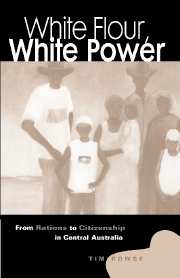Book contents
4 - Town, Cash and Supervision
from PART TWO
Published online by Cambridge University Press: 23 October 2009
Summary
Since the 1880s, police had issued rations near the town of Stuart (renamed Alice Springs in 1933). Wiltshire mentioned a camp of 200 south of Heavitree Gap, living partly on rations which he was responsible for issuing. At the turn of the century, there were large rationed camps near the Telegraph Station, two kilometres up the Todd River from the few buildings that then made up the town, and near the police station at Heavitree Gap, about five kilometres to the south. As a small town began to grow, some of these Indigenous people found work. Both Deputy Protector J.T. Beckett and the Australian Inland Mission nurse Jean Finlayson reported such employment in 1914, without saying whether payment included cash. It is likely that, because the utility of cash depended on workers' proximity to places where it could be spent, money first began to be sought and used by Aborigines in Alice Springs. An enduring place of trade, Alice Springs by 1901 boasted a pub and three stores among its nine buildings. The 1921 Census noted thirty buildings and 231 persons (including those known as ‘half-castes’). Only in Alice Springs could there be a continuously developing cash-based labour market. By the late 1920s, getting and spending a little money was probably a realistic expectation among people who frequented the town and lived on rations, hunting and what cash they could earn.
- Type
- Chapter
- Information
- White Flour, White PowerFrom Rations to Citizenship in Central Australia, pp. 68 - 79Publisher: Cambridge University PressPrint publication year: 1998



